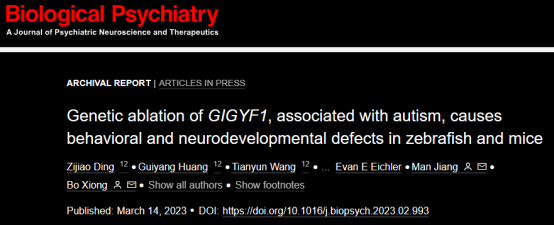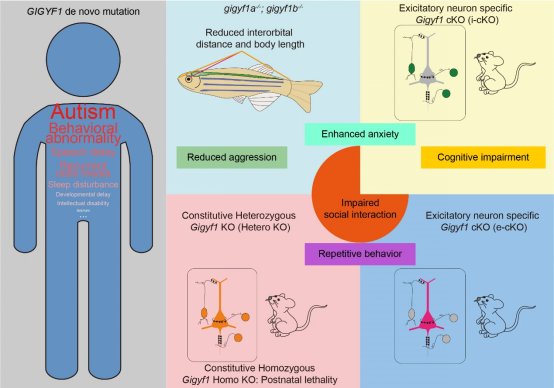Autism spectrum disorder (ASD) is a complex neurodevelopmental disorder, and the core symptoms are social impairment and repetitive/stereotypic behaviors. Although the pathogenesis of autism is still unclear, it is well-accepted that genetic factors contribute to more than 80% of all ASD cases. In recent years, researchers have identified a large number of risk genes through high-throughput sequencing techniques, suggesting a high genetic heterogeneity. Subsequent studies in animal models have provided clues to uncover pathogenic mechanisms and explore potential therapeutic targets.

On March 14, 2023, Prof. Bo Xiong's group in the Department of Forensic Medicine and Prof. Man Jiang's group in the School of Basic Medicine at Tongji Medical College of Huazhong University of Science and Technology published a paper entitled Genetic ablation of GIGYF1, associated with autism, causes behavioral and neurodevelopmental defects in zebrafish and mice online in an internationally renowned journal Biological Psychiatry. The paper presents a meta-analysis of genetic evidence for GIGYF1 as a significant risk gene for autism, and validates the association of GIGYF1 with autism in model organisms including zebrafish and mice. The authors also explored the underlying cellular and molecular mechanisms by proteomics, bulk RNA-seq and single-nuclei RNA-seq.
The team first performed data mining of whole-exome sequencing data from the SPARK project on 7015 autism families, and identified seven new GIGYF1 de novo mutations. They found that GIGYF1 mutations were significantly enriched in the neurodevelopmental disorder group. The patients showed similar symptoms including autism, generalized developmental delay, intellectual disability, and sleep disorders etc. To investigate the role of GIGYF1 in neurodevelopment, the team constructed GIGYF1 knockout models in zebrafish and mice, respectively, using CRISPR-Cas9 gene editing technology. In the zebrafish model, the mutants showed a significant developmental delay phenotype during early development, with abnormal cell proliferation and apoptosis in the brain. Mutant adults exhibited deficits in social behavior, anxiety and aggression. The constitutive GIGYF1 heterozygous knockout mice exhibited typical autistic-like behavior with deficits in social novelty and increased grooming behavior (repetitive stereotypic behavior). By contrast, deletion of GIGYF1 in cortical/hippocampal excitatory neurons leads to autistic-like behaviors, while deletion of GIGYF1 in inhibitory neurons leads to increased anxiety and impaired cognitive performance. Further, proteomic and transcriptomic analyses revealed that GIGYF1 regulates glutamatergic neuron-related genes, such as SLC17A7 and GRM2. Single-cell sequencing results suggest that GIGYF1 knockout mice have abnormally increased glutamatergic neurons in the CA2-CA3 region, possibly by affecting the balance of excitatory/inhibitory neurons and leading to behavioral abnormalities such as socialization. This study clarifies the relationship between GIGYF1 mutation and autism phenotype and shed light on further pathogenesis studies.

Dr. Bo Xiong and Dr. Man Jiang are the co-corresponding authors of the paper. Dr. Zijiao Ding from the Department of Forensic Medicine, Mr. Guiyang Huang (PhD candidate) from the School of Basic Medicine, and Dr. Tianyun Wang (Assistant Professor from the School of Medicine, Peking University) are the co-first authors of the paper. This study was supported, in partial, by the National Natural Science Foundation of China (81721005, 81671118, 31871028).
